A Manager’s Guide to Auditing & Improving Company Culture
“Don’t f*** up the culture,” he said.
You’d expect a different response from someone who just invested a whopping $150 million in a startup, right?
Maybe something like…
- “Make sure everyone works hard,” or
- “Set bigger goals as a company and strive to achieve them.”
These are all valid points, no doubt.
But no, Peter Thiel said nothing close to those when he invested in Airbnb. When Brain Chesky (Airbnb’s CEO) asked Thiel for the single most important advice he could give the team, he replied:
Don’t f*** up the culture.
Considering he has managed many employees before, Peter Thiel would have solid reasons for that response, right?
Correct!
And he’s not the only one.
In a study reported by Mazars, like Thiel, over 78.3% of investors (who mostly managed employees before) said they’d like to see more extensive reporting on corporate culture.
The reason for this demand shouldn’t surprise you.
Your company’s culture is a real brand differentiator. Rajesh Subramania, FedEx Vice President and CMO, said something to this effect.
Rajesh said:
Our culture is the bedrock on which our brand and our company is built. Our culture is our ultimate differentiator.
For something that’s the bedrock of most successful businesses, it makes perfect sense to keep track of it. It’s common sense, really. If you hope to improve your company’s culture, you must track and audit it regularly.
No wonder, up to date, managers at Airbnb still adhere to Thiel’s advice.
Take Mark Levy, the company’s Global Head & Manager of Employee Experience, for instance. About a year ago, he wanted to track if Airbnb was still in line with its initial cultural philosophy of being an honest and 2-way dialogue company. To this effect, he surveyed the employees.
The results?
The company was no longer in line.
It was an outcome of the Culture Amp [an employee experience software] survey that we realized we had to find a way to create and enable this two-way dialogue.
This discovery forced Airbnb to take immediate action.
Like Airbnb, exceptional companies prioritize culture, as evident in these company culture examples. But while executives are tasked with building it from scratch, who should be responsible for continuously auditing and improving company culture?
As Mark Levy did, managers (like you) should.
And that’s exactly what I’ll show you how to do in this article.
You’ll see how to track metrics relevant to improving your company’s culture, which, by extension, improves employee engagement. But, most importantly, you’ll see how to automate the entire process from one team pulse survey dashboard:

Track, Measure, & Improve Your Company Culture.
Try ShowUp 6-Months Free]
Table of Contents:
What’s the Impact of Improving Company Culture?
As I’ve established, culture isn’t static.
Imagine if Airbnb’s Mark Levy didn’t survey his employees to see if things were still in shape culture-wise. He wouldn’t have discovered there was work to do. And without that discovery, their culture would’ve fallen apart.
In other words, culture is dynamic.
And as such, improving it regularly is vital.
A study reported by Forbes supports this.
In the research, over 90% of US-based CEOs said culture was vital to their company. But more importantly, they believed improving it regularly contributed to their companies’ improved values.
Sir Win Bischoff, Chairman of UK’s Financial Reporting Council, said it best.
According to him:
Culture in business is a key ingredient in delivering long-term sustainable performance. When there is a healthy culture, the systems, procedures, and overall functioning and mutual support of an organization exist in harmony. This brings enhanced integrity, confidence, long-term success, and, ultimately, trust. A poor culture is, in my view, a significant business risk in itself.
Additional benefits of improving your company’s culture are:
- A more productive organization
- Engaged employees
- Happy and satisfied customers and employees
- Increased financial growth of the company
- Higher employee retention rate
- Minimal burnout rates for both employees and managers.
As an employee myself, here’s my take on these outlined benefits.
If you prioritize improving your organization’s culture, you stand to gain most, if not all, the benefits outlined above. You’ll also end up instilling a culture of innovation in your employees.
But the question is, where should you start from?
I’ll tell you.
The first thing a manager should do before any culture improvement measure is Culture Auditing. This involves analyzing your company’s current culture and creating an improvement plan.
Business Consultant, Larry Alton, noted this in this Forbes article:
Once you understand that company culture is truly important to your business’s future (and it’s about to become even more important), you may want to perform a “culture audit.” Essentially, this is a way to evaluate where your culture currently stands, see what (if anything) is missing, and establish a plan to make corrections.
This ‘culture audit’ assessment does two things:
- It pinpoints the problem areas in your company. This is to give a clear picture of what you’re trying to solve,
- The information from the audit then allows you to tailor improvement efforts specific to the problems you’re facing.
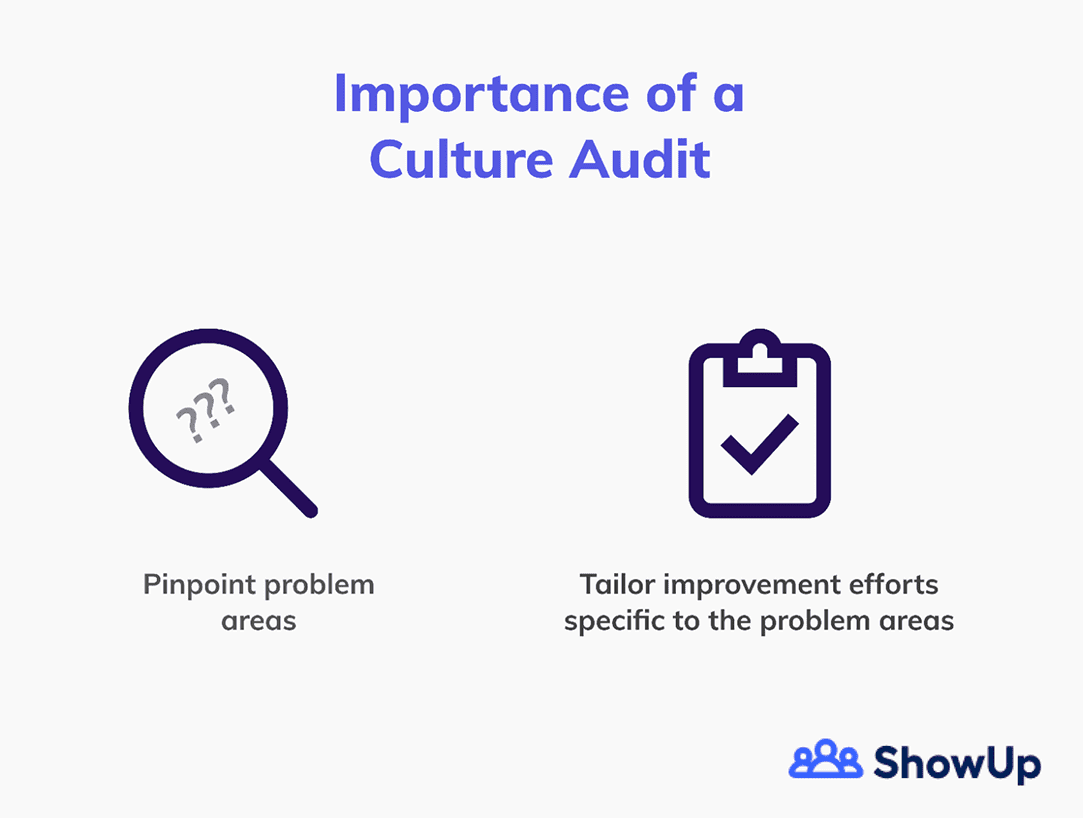
How to Audit Your Current Company Culture
A board agenda survey reported by Mazars asked CEOs, managers, and directors what their primary source of information was when assessing their current culture.
The overwhelming response?
Employee feedback.
About 70% (two-thirds) relied on feedback from employees to measure their culture. This response also proved that internal auditing of workplace culture is dependent on employees’ feedback.
Let me rephrase that.
Honest feedback, not just any kind of random feedback, is vital to culture auditing. The keyword again is honesty.
But employees are likely to be dishonest if you ask them for feedback physically. Now, if physical interviews won't get you the response you desire, how can you get honest feedback from employees?
That’s where anonymous pulse surveys come in.
Anonymous surveys are a great way to assess your company’s culture. It also helps check the state of well-being of the employees you’re managing. Because these surveys are anonymous, you can be sure the response is honest, as employees won’t fear you’d use their feedback against them.
ShowUp, an employee engagement software, makes collecting honest staff feedback relevant to auditing and improving culture a breeze.
The software automatically sends anonymous employee surveys weekly or bi-weekly (based on your preference):
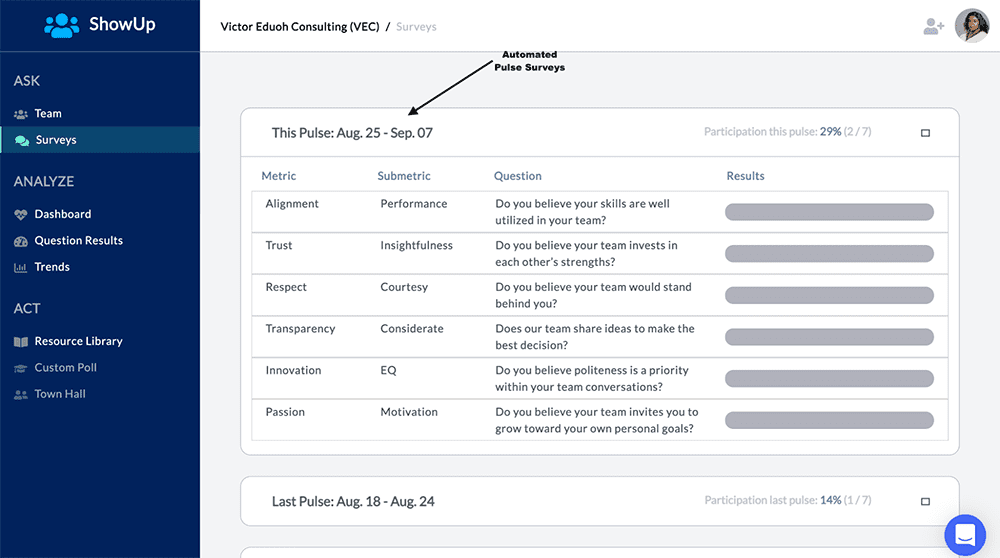
It also makes it fun and easy for employees to complete your survey.
Once they answer the first question sent to their inboxes, the software smoothly transitions them to complete the rest in five easy clicks.
This leaves you (the manager) with a comprehensive, birds-eye overview of metrics relevant to your company’s culture:

That's not all.
ShowUp goes further to show you the specific problem areas you're facing. Our software then recommends helpful resources to solve the problems. Doing this guides you with actionable resources to improve your company’s culture:
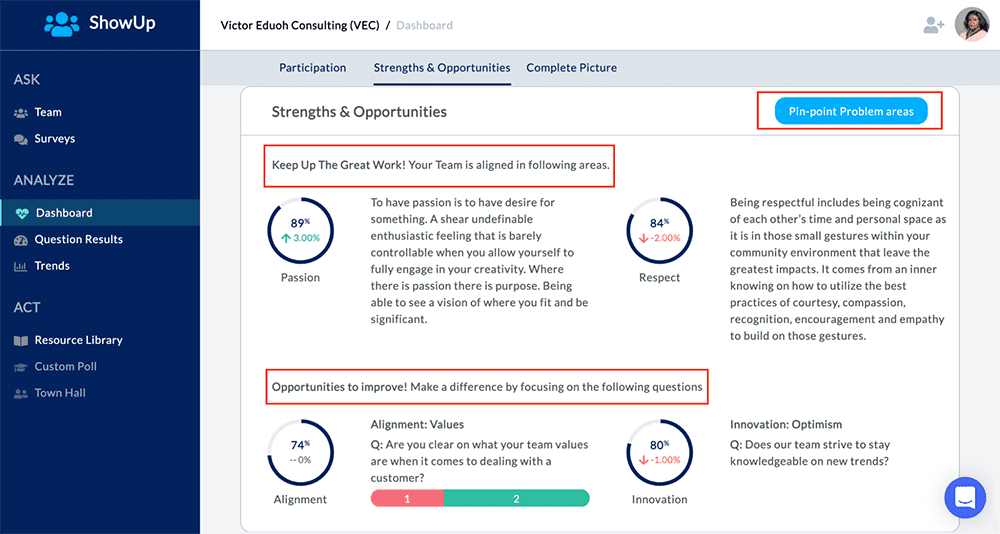
Audit & Improve Your Company Culture with Automated Pulse Surveys
Try ShowUp 6-Months Free]
How to Improve Your Company’s culture
Once you’ve audited your organizational culture, the next step is improving it.
Below are six practical ways to do just that:
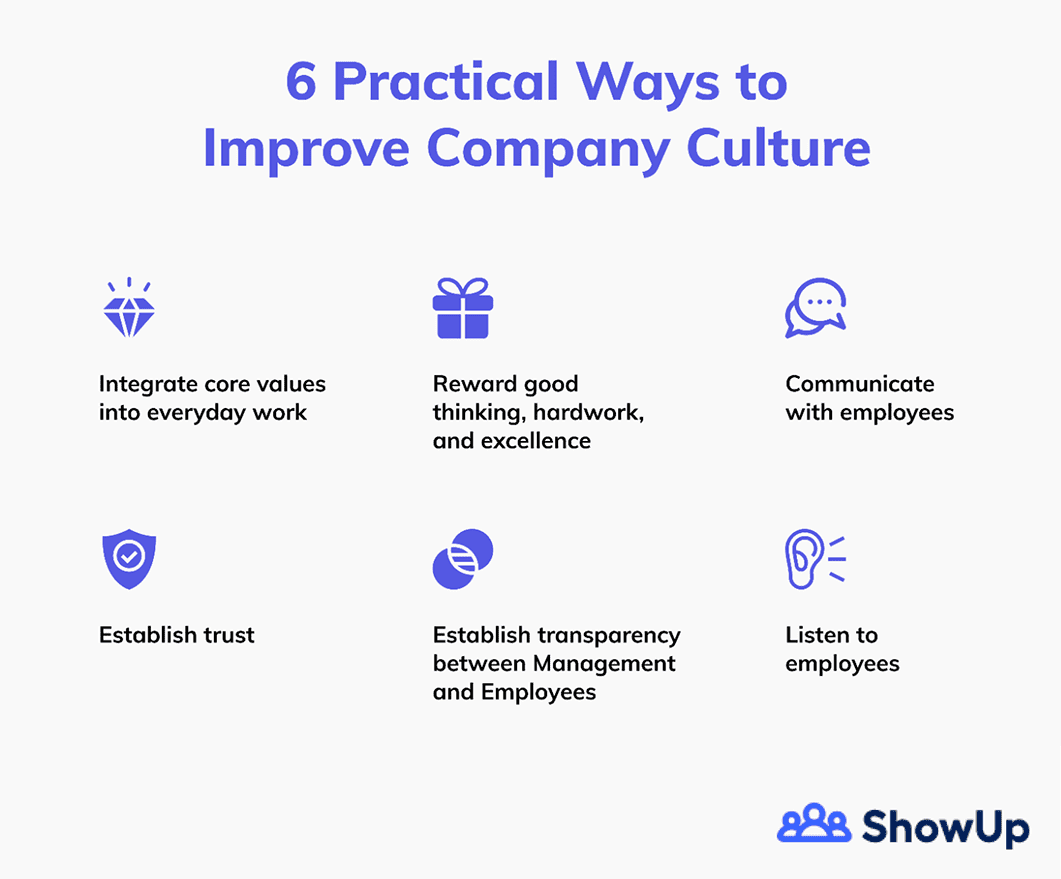
1. Integrate core values into everyday work
Courtney Chapman, Product Manager, Rubicon Project, once said:
Company culture is the product of a company’s values, expectations, and environment.
Put another way, a company’s core values influence its culture. When such values are upheld, the culture of the workplace is at its best.
Cyber Grants reports that these core values should be the principal and fabric guide of all company decisions. It should be evident in the actions of you, the manager, and the behavior of employees.
You are to reinforce your values in all communication channels, bulletins, newsletters, meetings, surveys, etc. Encourage your workers to know them offhand. Chances are they’ll start to imitate these core values subconsciously.
The result of doing this yields improvements in your organizational culture.
2. Reward good thinking, hard work, and excellence
Human beings crave recognition and reward for their efforts.
As Dr. Ashley Whillans from Harvard Business School said:
What really matters in the workplace is helping employees feel appreciated.
In other words, when managers act on this innate desire in their employees for recognition, three things happen:
- The staff stays for a longer time: “People may take a job for more money, but they often leave it for more recognition” — Bob Nelson.
- They put their all into their job: “People work for money but go the extra mile for recognition, praise and rewards.”– Dale Carnegie, a Leadership Training Guru.
- A stronger workplace culture emerges: According to research by Cicero Group, 49% of employees believe being thanked and recognized by their managers helps build their relationships and trust.
In essence, adopt a recognition-rich culture and appreciate your team members more. Also, commend their efforts, and in return, your organizational culture will improve.
3. Communicate with Employees
This article by the Management Study Guide Content Team states:
Communication between the top management and the employee needs to be effective for a better work culture.
Effective communication is an integral part of a company’s culture. It is a two-way street between senior management and team members.
Unfortunately, a lot of managers don’t realize this. According to a Gallup report, only 13% of employees strongly agree that their managers and leaders communicate effectively with them.
I wonder what the environment of the remaining 87% will be like. You can bet the culture will be struggling, and misinformation will be rampant. I say this because communication leads to higher levels of trust in the workplace, especially as employees can easily reach out and talk to you one-on-one.
And with the rise of social technology tools, doing this is now easy.
For instance, you can use Slack for team communication, Zoom for quick video calls, Plutio (a Trello alternative) for project management, etc. According to McKinsey’s report, these tools can raise productivity by 20 to 25%.
This increased productivity can, in turn, positively impact your corporate culture and employees’ engagement.
4. Establish trust
The Edelman "Trust Barometer" study revealed that one in three people don’t trust their employer. By the way, this research spanned 33,000 people in 28 countries, so it is quite an accurate representation.
What is the implication of this result for a company?
Lack of progress.
Will Otto, Director of Talent Optimization at PI, opened this article, saying:
The secret to any high-performing team is trust.
Organizational trust is essential. It links to higher levels of organizational performance and competitiveness.
ShowUp’s pulse surveys also track trust because of how essential it is to improve company culture. Each survey comes pre-loaded to help track even sub-metrics related to building trust in your workplace:
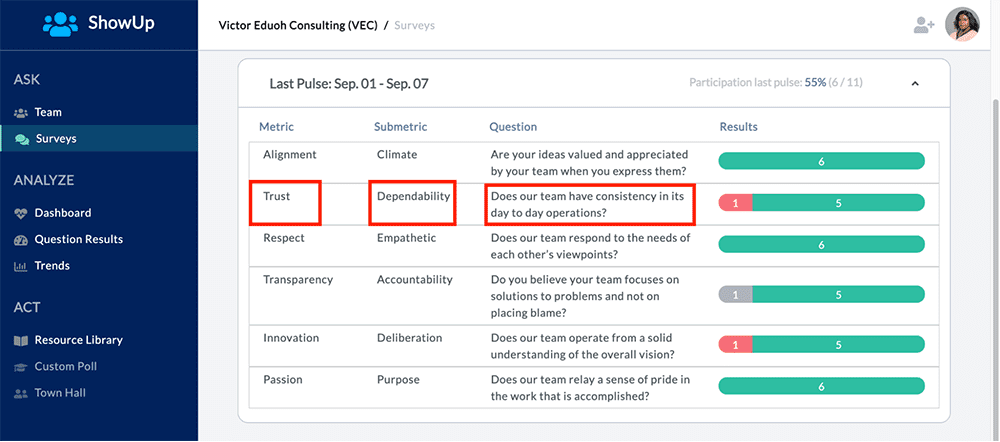
ShowUp measures manager-employee trust for improving company culture.
5. Establish transparency between Management and Employees
Management transparency has a correlation coefficient factor of 0.94 to employee happiness, according to TINYPulse. Remember when I said happier employees are one of the benefits of a great culture?
Well, it then stands to reason that establishing workplace transparency between you (the manager) and your staff improves culture.
A transparent work environment leads to happier employees and then to strong company culture. Buffer is an excellent example of a transparent workplace.
It’s probably why the company’s Founder, Leo Widrich, said:
To us, transparency isn't a buzzword. It's a huge competitive advantage when everyone knows what everyone is working on. It seems obvious, right? But I'm shocked by how many companies don't take any steps to make their companies more transparent. This is after they say they understand the importance of transparency.
6. Listen to employees
The ability to listen is one every manager should have.
I dare say this is the most potent skill a manager interested in improving their company’s culture can possess.
I like the opening statement from this Spark Hire article:
If you’re listening closely, what you hear might be the beginnings of a great company culture.
Good company culture grows when you listen to the thoughts and concerns of employees. In short, about 75% of employees would stay longer with a manager and organization that listens to their concerns.
You can also listen to employees via automated team pulse surveys.
As described earlier, pulse surveys are short, targeted questions measuring specific employees’ traits.
Note, it’s different from the regular engagement survey managers conduct yearly. Managers send out pulse surveys regularly (weekly, bi-weekly) to employees. Doing this is crucial because it allows you to listen to what your staff are saying so you can act immediately.
Besides listening, acting on the feedback obtained is equally as important.
And this is because if you don’t take action, your employees will be reluctant to provide feedback in the future.
ShowUp helps you listen to employees. It also provides you with the resources needed to act swiftly on feedback, all from one dashboard:

Conclusion: Improve Your Company Culture with Pulse Surveys
Data from Tinypulse shows employees who don't like their company's culture are 24% more likely to quit their jobs.
As a manager, you have a stake in the success of the company. And this involves taking proactive steps today to improve your company's culture.
Don’t ignore the culture until it gets toxic.
Be proactive like Mark Levy of Airbnb (mentioned at the beginning of this article). Mark audited his team, and from the feedback, he discovered opportunities to improve his company’s culture.
By doing this, he adhered to Peter Thiel’s advice to Airbnb’s CEO. Do you still remember what his advice was?
He said:
Don’t f*** up the culture.
Bob Parsons, Founder of GoDaddy, told us how to avoid messing things up when he said:
Anything that is measured and watched, improves.
With pulse surveys, you can measure and watch your company’s culture. In no time at all, you’d get real-time, audited insights to improve your company’s culture.
And you can achieve all this with ShowUp’s team pulse survey software.
Via its automated, anonymous surveys sent directly to your employees’ inboxes, ShowUp helps you track, audit, and act on metrics pertinent to improving your company’s culture regularly.
